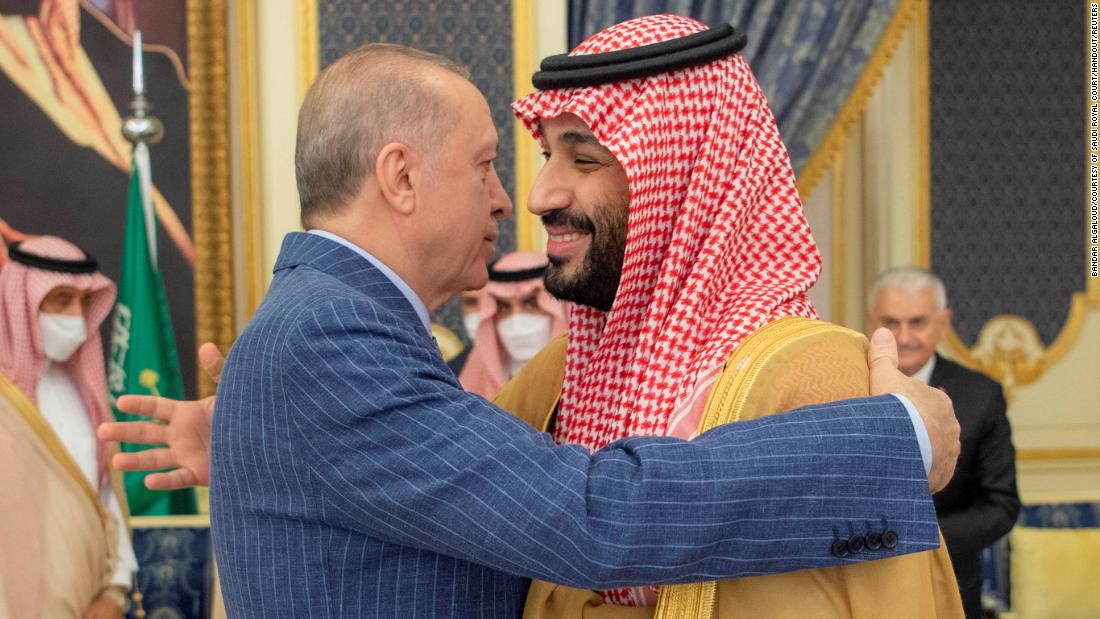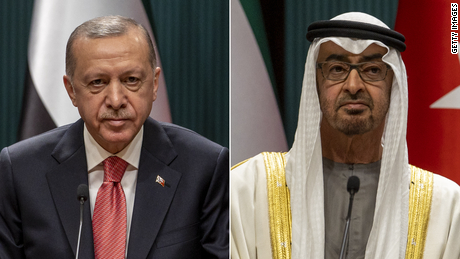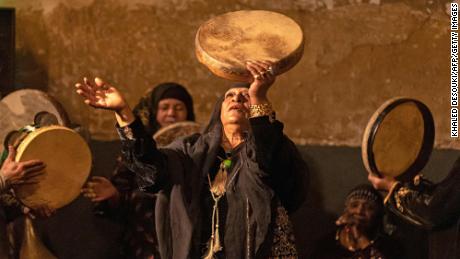
Turkish president Recep Tayyip Erdogan met with Saudi crown prince Mohammed bin Salman (MBS) and King Salman on Thursday after arriving for his first visit in five years. He will be hoping to turn the page on a tumultuous period in relations between the two Middle East powers.
Speaking before his departure from Turkey, Erdogan listed a host of areas in which the two countries can cooperate, including health, energy, food security, defense and finance.
Turkey and Saudi Arabia have plenty of historical baggage. The Ottoman Empire left a bitter aftertaste in the kingdom after it was replaced by the Saudi ruling dynasty. And today, Erdogan’s form of political Islam is a potential poison for MBS’ monarchic leadership.
He and MBS also share concerns in many regional disputes including Syria, Iran, Lebanon, and Hezbollah. There is plenty of scope to exploit common ground to the benefit of both.
Erdogan’s sagging economy needs Saudi cash. Promises of business deals and a filler for his dwindling state coffers would be welcome. That sort of help buys the Turkish president more time in power, which MBS understands well.
But what MBS could really use is a way to get out of US President Joe Biden’s bad books, and a reliable, non-judgmental, security partner.
How Erdogan fits into that will depend on the diplomatic trades the two leaders can make.
Ambiguity is the lifeblood of international relations, and on that front, Erdogan has already played his first card.
By dropping his demand for a Turkish trial of the Saudi government agents believed to have murdered Khashoggi — a killing which the CIA assesses was ordered by MBS — Erdogan has effectively laid aside the figurative stick many Western leaders have used to beat MBS.
There is plenty that the Turkish leader could bring to the table with MBS. The Saudi crown prince may want Erdogan to weaken his military’s ties to neighboring Qatar. The two Gulf nations are only recently over a years-long spat that saw Doha invite Turkey to open a military base in Saudi Arabia’s backyard. Riyadh and Ankara may also want to move to a post-Syria-conflict status that weakens Hezbollah and Iran while stabilizing Lebanon — that probably means keeping Syrian leader Bashar al-Assad in power.
Such significant and difficult deals can’t be done without MBS and Erdogan balancing each other’s needs around the table.
Chinese President Xi Jinping is expected to visit Riyadh soon. Any new military cooperation between the two countries would come with a hefty price tag — not in terms of the sticker price, which Riyadh can easily afford, but in terms of the favors China is expected to call for in the future, which could put Saudi on the wrong side of the emerging new global order.
The 2011 Arab Spring showed the Saudis that should a revolution come, the US wouldn’t come to the royals’ rescue. A decade since, the divisiveness of US politics has reinforced the view in Riyadh that American leaders are so consumed by their domestic politics that they can’t fully focus on foreign policy. Even if a reliable US partner appears, the thinking goes, that person could be gone at the next election.
But it is MBS, more than Erdogan, who is at a potential crossroads. Does he give in to bitterness over the US’s handling of the Middle East and continue to get frozen out by Biden, or does he work up a strategy not to land on the wrong side as the new iron curtain comes down?
Other top Middle East news
At least 42 injured in confrontation between Palestinians and Israeli Police at al-Aqsa Mosque compound
At least 42 people were injured in a confrontation between Palestinians and Israeli police at the al-Aqsa Mosque compound in Jerusalem, the Palestinian Red Crescent said Friday. Israeli authorities said they were responding to “hundreds of rioters and lawbreakers” engaged in violent disturbances.
- Background: The incident took place at the site, which is holy to both Jews and Muslims, on the last Friday of Ramadan. . Tensions at the compound have been heightened during Ramadan, with clashes occurring every Friday. The Red Crescent accused Israeli forces of preventing its workers from entering the compound, and of “wounding and beating one of our crews.”
- Why it matters: Tensions have been high in Jerusalem after Israeli police entered the Al Aqsa compound earlier this month to counter what they described as riots by Palestinians, which left more than 200 wounded, according to the Palestinian Red Crescent. The violence has tested Israeli Prime Minister Naftali Bennett’s coalition government, as well as triggered various diplomatic responses from neighboring Arab states.
Yemen’s Saudi-led coalition to release 163 Houthi prisoners
The Saudi-led coalition fighting the Iran-backed Houthi rebels in Yemen will release 163 Houthi prisoners who fought against the kingdom, the Saudi state news agency SPA reported Thursday, adding that the coalition has already begun measures to release them in coordination with the International Committee of the Red Cross.
- Background: Yemen’s Iran-backed Houthis and the Saudi-led coalition have been at war for the past seven years, but on April 2 agreed to a two-month truce brokered by the United Nations. Prisoner swaps have been in discussion by both sides under the auspices of the UN, which could free up to 1,400 Houthi prisoners in return for 823 coalition prisoners.
- Why it matters: Saudi Arabia and other Gulf monarchies are concerned about what they see as waning US interest in their security, as well as over a potentially emboldened Iran following a nuclear deal with world powers, and have begun taking steps at de-escalation. Riyadh has also resumed direct talks with Iran, which supports armed proxies around the region, including in Yemen.
Iran says it moved centrifuge machines due to earlier attack on nuclear site
Iran’s relocation of significant parts of its centrifuge machines to a safer location was due to a “terrorist attack” on the Karaj nuclear site, the spokesman for the Atomic Energy Organization of Iran was quoted saying in Iranian media on Friday.
- Background: The United Nations nuclear watchdog said on Thursday that Iran has moved its new Natanz centrifuge workshop, where it makes machines that enrich uranium, to an underground location. The machines are from a now-closed facility at Karaj that Tehran says was sabotaged by Israeli attacks. Iran’s centrifuge workshop can make parts essential to advancing its uranium enrichment program.
- Why it matters: Iran has engaged in nuclear talks with world powers over the past years, in efforts to revive a 2015 nuclear deal that was scraped by then-president Donald Trump in 2018. Any new nuclear activity by Iran risks complicating the talks.
Around the region
Marvel’s new “Doctor Strange in the Multiverse of Madness” movie is facing a snag in the Middle East, where censors in some countries reportedly have a problem with one of the movie’s LGBTQ characters.
The film features an interdimensional superhero, America Chavez, a lesbian who is shown in one scene referring to her two mothers. A 12-second edit is what Saudi Arabia has requested, the country’s general supervisor of cinema classification told the Guardian. He said Marvel’s parent company Disney has refused to make the edits, according to the paper.
IMAX theaters in Egypt announced on Twitter that the movie “won’t be released” in the country, without saying why. It was also not listed in the “upcoming movies” sections of theatre websites in Saudi Arabia, Qatar and Kuwait.
Disgruntled fans on Twitter pointed out that the same type of content the movie is being banned for is already available on streaming platforms like Netflix, with one user calling the move to ban the movie “hypocrisy at its finest.”
Authorities in Saudi Arabia, Kuwait, Qatar and Egypt did not respond to CNN’s request for comment. Disney didn’t respond to CNN’s request for comment.
Egyptian film critic Joseph Fahim said LGBTQ themes aren’t new to Arab audiences. “We are used to seeing gay characters in Arab films,” he told CNN, citing films going as far back as Salah Abou Seif’s 1958 “The Barred Road,” and as recent as Netflix’s Arabic adaptation of “Perfect Strangers,” which features a closeted gay father. As LGBTQ characters become more prominent in American cinema, Middle Eastern countries “have to adapt or find movies from other cultures.”
This isn’t the first Marvel movie to cause a stir among censors in the Arab world due to LGBTQ themes. Last year, the movie “Eternals” caused a similar issue over LGBTQ rights that ended up being banned in Saudi Arabia, Qatar, and Kuwait.
By Mohammed Abdelbary

